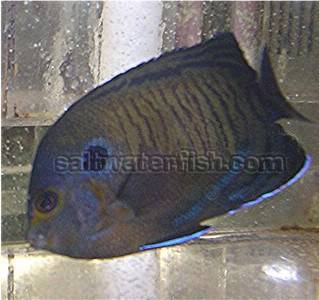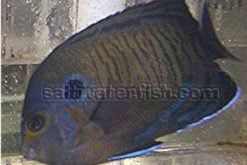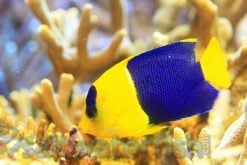Bluefin Pygmy Angelfish – (Centropyge multispinnis)
Quick Stats:
- Care Level
- Temperament
- Diet
- Reef Safe
- Minimum Tank Size
- Nature Max Size
- Water Parameters
Comprehensive Guide: Bluefin Pygmy Angelfish – (Centropyge multispinnis)
The Bluefin Pygmy Angelfish, also known as Centropyge multispinnis, is a small and colorful saltwater fish that is popular among aquarium enthusiasts. In this comprehensive guide, we will explore various aspects of this species, including its habitat, reef compatibility, size, temperament, lifespan, diet, aquascaping recommendations, availability as captive bred, compatibility with other fish and invertebrates, and common names it is known by.
Habitat:
The Bluefin Pygmy Angelfish is typically found in the Western Pacific Ocean, particularly in the waters surrounding Indonesia and the Philippines. It inhabits coral reef areas with moderate water flow and plenty of hiding spots like caves and crevices.
Reef Safe:
The Bluefin Pygmy Angelfish is generally considered reef safe, as it typically does not nip at corals or other sessile invertebrates. However, individual behavior may vary, and it’s important to monitor their behavior closely when introducing them to a reef aquarium.
Size:
The Bluefin Pygmy Angelfish is a small species, reaching a maximum size of around 3 inches (7-8 cm) in length. It is one of the smaller angelfish species available for marine aquariums.
Temperament:
This angelfish species is known to be peaceful and generally gets along well with other fish in the aquarium. However, it may become territorial towards other similar species, so it’s recommended to keep only one Bluefin Pygmy Angelfish per tank unless the tank is large enough to accommodate multiple individuals.
Sexual Dimorphism:
There are no visible differences between male and female Bluefin Pygmy Angelfish. Both sexes have similar appearances and coloration.
Lifespan:
The average lifespan of the Bluefin Pygmy Angelfish is around 5-7 years in a well-maintained aquarium. Providing proper care, nutrition, and a suitable environment can contribute to their longevity.
Diet in Aquariums:
The Bluefin Pygmy Angelfish is omnivorous and feeds on a variety of foods, including algae, small invertebrates, and meaty foods. In the aquarium, it can be offered a balanced diet consisting of high-quality angelfish pellets or flakes, frozen or live foods like brine shrimp, mysis shrimp, and spirulina-based flakes or pellets. Providing a varied diet will help ensure their nutritional needs are met.
Aquascaping Recommendations:
When creating an aquarium environment for the Bluefin Pygmy Angelfish, it’s important to provide plenty of hiding spots and caves to mimic its natural habitat. Adding live rock structures with crevices and caves will not only provide shelter but also encourage natural foraging behavior. It is recommended to include a mix of open swimming space and areas for the fish to explore and hide.
Availability as Captive Bred:
The Bluefin Pygmy Angelfish is not commonly available as captive bred. Most specimens available in the aquarium trade are wild-caught. However, this may vary depending on availability from breeders and suppliers.
Compatibility with Other Fish, Invertebrates, or Corals:
The Bluefin Pygmy Angelfish is generally compatible with a variety of peaceful fish, invertebrates, and corals. However, caution should be exercised when keeping it with other angelfish or closely related species, as territorial disputes may occur. It is generally considered safe to keep them with other small peaceful fish, such as gobies, dartfish, clownfish, and some wrasses.
Here are five specific tankmates that can be good choices for the Bluefin Pygmy Angelfish:
- Firefish – Peaceful and colorful fish that can coexist peacefully with the Bluefin Pygmy Angelfish.
- Yellow Watchman Goby – A small, bottom-dwelling fish that can form a symbiotic relationship with pistol shrimp and add diversity to the aquarium.
- Banggai Cardinalfish – Peaceful and easy to care for, these fish are known for their unique appearance and behavior.
- Cleaner Shrimp – These shrimp can serve as both a cleaning crew and an interesting addition to the aquarium.
- Soft Corals (e.g., Zoanthids, Mushroom Corals) – These corals can add color and movement to the aquarium without posing a threat to the Bluefin Pygmy Angelfish.
Other Common Names:
The Bluefin Pygmy Angelfish may also be known by other common names, such as Multicolor Pygmy Angelfish or Bluefin Pygmy Angel.
At Reefs4Less.com, we offer a wide selection of high-quality marine fish, including the Bluefin Pygmy Angelfish. Our fish are carefully sourced and handled with utmost care to ensure their health and well-being. We prioritize customer satisfaction and provide detailed information about each species to help aquarium enthusiasts make informed decisions. When purchasing from Reefs4Less.com, you can expect excellent customer service, reliable shipping, and healthy fish for your saltwater aquarium.
Popular Questions and Answers:
- Q: What is the ideal water temperature for the Bluefin Pygmy Angelfish?
A: The Bluefin Pygmy Angelfish thrives in water temperatures ranging from 75°F to 80°F (24°C to 27°C). - Q: Can the Bluefin Pygmy Angelfish be kept in a reef aquarium?
A: Yes, the Bluefin Pygmy Angelfish is generally considered reef safe, as it typically does not harm corals or other reef invertebrates. However, individual behavior may vary, and caution should be exercised when introducing them to a reef tank. - Q: How often should the Bluefin Pygmy Angelfish be fed?
A: It is recommended to feed the Bluefin Pygmy Angelfish small amounts of food multiple times a day. Aim to provide a varied diet and monitor their feeding behavior to ensure they are consuming enough. - Q: Can the Bluefin Pygmy Angelfish be kept in a small aquarium?
A: While the Bluefin Pygmy Angelfish is small in size, it still requires a tank with a minimum size of 30 gallons (113 liters) to provide ample swimming space and accommodate its territorial tendencies. - Q: Is the Bluefin Pygmy Angelfish suitable for beginners?
A: The Bluefin Pygmy Angelfish can be suitable for beginners with some prior experience in maintaining a saltwater aquarium. They require stable water conditions, proper diet, and regular maintenance to thrive.
| Size | < 2 inches |
|---|




Reviews
There are no reviews yet.